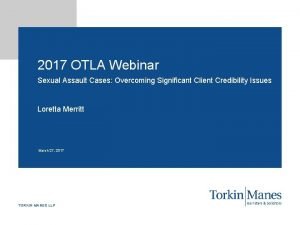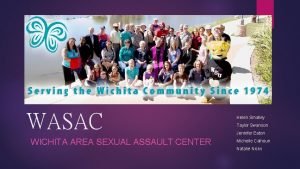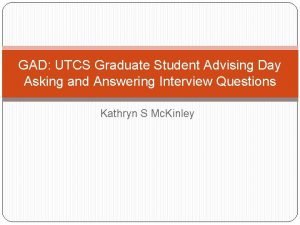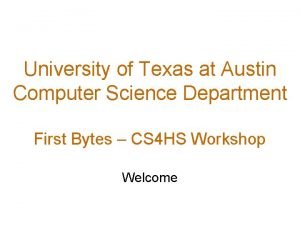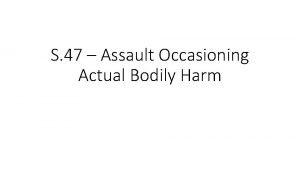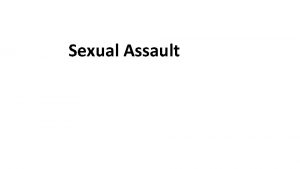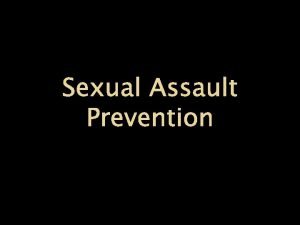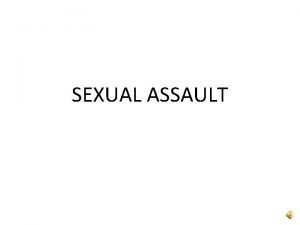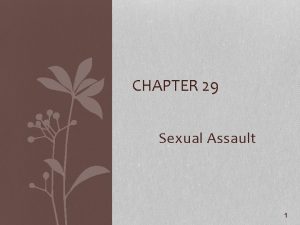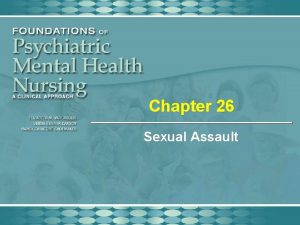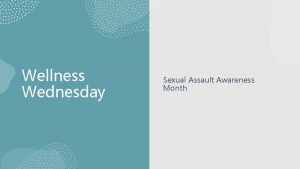Sexual Assault on UTCs Campus Can We Do










- Slides: 10

Sexual Assault on UTC’s Campus: Can We Do More? Rachel Emond, Lauren Greenspoon, Caroline Waldron

The questions we will be covering today: 1. Why is this an important topic for us to discuss? 2. How prevalent is sexual assault on college campuses? 3. What are the programs and resources we already have? 4. What are other universities doing that we aren’t doing? 5. How does state and federal legislation affect this discussion? 6. What kind of project are we going to pursue?

Why is this an important topic to discuss? Every 2 minutes, an American is sexually assaulted. ¹ There an average of more than 288, 000 victims of rape and sexual assault that are over the age of 12 every year. ¹ Those in the age range of 12 -24 are the most likely to be victims of sexual assault. ¹ College women are 3 times more likely than women in general to be victims. ¹ College men are 5 times more likely than men in general to be victims. ¹ Around 70% of sexual assault victims will experience extreme distress, which is higher than any other violent crime. ¹ This topic is important because sexual assault is an epidemic, and universities are at the forefront of the problem.

How prevalent is sexual assault on college campuses? 2 2 Transgender students and students in the Greek community 1 are even more likely to experience sexual assault.

What are the programs and resources we already have? -Student Health Services: Services is a clinic open to the population on campus that treats anything from a common cold to testing for evidence after a sexual assault has taken place. -The Counseling Center: Provides individual and group counseling, testing, and consultation. -The Dean of Students: A place that wants to be your advocator and help make the best of your college experience. -A Title IX Coordinator: One who deals with sexual assault and domestic violence, and who are mandated reporters. -Campus Police: full-service law enforcement agency. -The Transformation Project: strives to reduce the impact of power-based violence through educating. -The Women’s Center: committed to creating a community of diverse and empowered students through awareness, activism, collaboration, leadership, & community.

What are other universities doing that we aren’t doing? -The University of Arizona & ETSU have Campus Health Oasis Programs, which are meant to be educational in nature and help increase discussion about sexual assault. -The University of Alabama-Birmingham has a specific line for Rape Counseling. -The University of Michigan has a Sexual Assault Prevention & Awareness Center, in which they regularly offer educational programming regarding sexual assault for students. -The University of Michigan offers over 110 resources to those with experiences dealing with sexual assault, sexual violence, or domestic violence, enlisting typical counseling programs, administrative offices, advocacy centers, medical resources, & campus and local authorities. -The University of Michigan also offers innovative programs such as Peer Support Group (PSG), which is a group therapy session for male victims of sexual assault and the UM Abuse Hurts Initiative, which is an education initiative to teach students about dating violence. Another interesting resource they offer is an ally training for those who have not experienced sexual assault but still want to help victims and peer led support groups for victims.

What are other universities doing that we aren’t doing? Cont. -At Stanford University, all staff members are required to take one of the four different types of trainings related to sexual harassment, which is dependent on their position. All students are required to complete an online training before enrolling to the school, with additional training at New Student Orientation. -Stanford also offers Sexual Assault & Relationship Abuse Education and Response (SARA) which includes programming. They also include a Confidential Support Team (CST) which is a 24/7 hotline. -The University of North Carolina at Wilmington has a program called UNCW SOAR Bystander Intervention Model, which students who join an organization on campus are required to complete. -UNCW also trains women in a Rape Aggression Defense System, and ETSU has a similar defense program also.

How does state and federal legislation affect this discussion? -Title IX of the 1972 Education Amendments prohibits sex discrimination in education. ³ - The Jeanne Clery Disclosure of Campus Security Policy and Campus Crime Statistics Act was put into effect in 1990. The Clery Act requires that institutes of higher education annually disclose information about crimes committed on campus. ³ -In 1992, The Clery Act was amended to include a Campus Sexual Assault Victims’ Bill of Rights, which required that all academic institutions develop and implement prevention policies and provide certain assurances to victims of sexual assault. ³ - In 2013 Violence Against Women Act included a section of the Campus Sexual Violence Elimination Act. It started the grant program that targeted all types of violent crime on campuses and expanded the disclosure of campus police crime statistics to improve awareness on violent sex crimes. ³ - Tennessee specifically has vague laws on sexual assault. There is no law protecting victims of voluntary/temporary intoxication. Force must also be used to be prosecuted. ⁴

What kind of project are we going to pursue? - Survey of UTC’s campus population (goal of 10%) - The survey will be looking specifically at student’s knowledge of programs on campus, resources available to victims, and if the available resources are sufficient. - We believe it will be best to work with Stephanie Rowland, the Title IX Coordinator, and the staff at the Women’s Center to best complete this project.

References 1. https: //www. rainn. org/statistics/victims-sexual-violence 2. http: //www. campusanswers. com/campus-sexual-violence-infographic/ 3. http: //www. aauw. org/what-we-do/legal-resources/know-your-rights-oncampus/campus-sexual-assault/ 4. http: //www. utc. edu/womens-center/transformationproject/policiesandlegislation/tca. php

